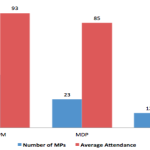Statistics for Maldives household food expenditure show a disturbing shift towards an “adverse dietary pattern”, with increased intakes of high-fat and sugary products, the Planning Department has revealed.
Health experts in the country have blamed the unhealthy diet of Maldivians for the high prevalence of cardiovascular diseases and metabolic disorders such diabetes among Maldivians, which account for almost 50 percent of the all deaths in the country. The comparative figure for the US is 25 percent.
According to the Household Income and Expenditure Survey, the structure of the Maldivian diet has shifted towards a “higher energy density diet with a greater role for fat and added sugars in foods, greater saturated fat intake, reduced intakes of complex carbohydrates and dietary fiber, and reduced fruit, vegetable and fish intakes.”
Eating less vegetables, fruits and fish
Overall, household expenditure on all the food groups has increased except for fruits and nuts, fish and vegetables.
The food expenditure on fruits and nuts reduced by 41.8 percent in the Maldives, although the percentage of the decline was higher among atolls, where a 45 percent reduction in fruits and nuts was recorded compared to the 30 percent decline in the capital Male’.
Within this group, food expenditure on bananas, tender coconut, papayas, coconut and apples declined by 50 percent or more in in 2010 compared to 2003, while the statistics further flagged a growing trend of substituting natural fruits with preserved or canned fruits.
“The household food expenditure on fruit cocktail and other canned and preserved fruits has increased over the period significantly,” the report read.
Household expenses on vegetables meanwhile recorded a 4 percent decline nationally, although an 18 percent and 33 percent increase was recorded in the atolls and Male’ respectively.
The Planning Department explained that expenditure on vegetables such as breadfruit, curry leaves and green chilli had reduced significantly, while spending on vegetables such as cabbage, onion and other fresh vegetables had “increased significantly.”
The department concluded: “If the changes in the prices are taken into account, in real terms, there is a decline in the household expenditure on fruits and vegetables. It is likely that there is an under-reporting of the consumption of own-produced fruits and vegetables such as breadfruits, green chili, curry leaves, coconut, papaya, etc, particularly in the atolls, as there is a difficulty valuing them in monetary terms.”
In the fish category – the traditional source of food for Maldivians – a net decrease of eight percent was recorded nationally in 2010.
In the same period, the spending patterns shows that eating fish declined by 23 percent in the atolls and in Male’ by 28 percent.
According the Planning department, the decline has most likely been caused by the decline in the overall fish catch since 2007 – therefore, shifting the people’s demand to the available alternative, imported meat.
“The household expenditure on frozen chicken and chicken products increased by 105 percent while the demand for sausages has increased by 306 percent,” the report observed.
“Sugar high”
According to the planning department, the food category that showed a “huge increase” in expenditure was sugar, jam, honey, syrups, chocolate and confectionery.
The major food products in this category that had a huge increase in the household expenditure included ice-creams, accounting to a staggering 4,630 percent increase in 2010, while chocolate increased by 1,071 percent, jelly by 1,332 percent and honey by 719 percent.
Although the planning department’s report does not specify, demand for caffeine, and energy drinks made with high fructose syrups or added sugar is on the rise among young.
Studies have concluded that added sugar is one of the greatest factors in the rise in obesity and other health conditions such as diabetes, tooth decay, poor nutrition and elevated triglycerides.
Furthermore, recent studies have also found eating too much sugar can make people forgetful and potentially cause permanent brain damage.
Meanwhile, spending on spices, short-eats and other snacks such as chicken rings, potato chips, popcorn – high in saturated fats – increased substantially over the period.
Health concerns
Growing consumption of high-fat and sugary products, combined with behavioral risk factors such as physical inactivity and tobacco use, has put a high number of people at the risk of non-communicable diseases such as heart and blood-related diseases, diabetes mellitus and other degenerative and chronic diseases, according to health experts.
Statistics from Health Mininstry show that in 2009, a total of 459 people (39 percent) died from circulatory system diseases which includes strokes, placing it at as the most common cause of death among all age groups, followed by respiratory diseases (12.3 percent).
Speaking to Minivan News, Internist Dr Ahmed Razee noted that consumption of healthy foods such as vegetables and fruits never reached the “preference levels” in the Maldives.
“Spending on vegetables or fruits have not declined. In fact, the truth is that it never increased,” Dr Raazee argued. “Junk food is commercially marketed and made available easily while the same thing has not be done for the vegetables and fruits,” he added.
Meanwhile, with unhealthy eating habits more people are in the having high levels of cholesterol and blood glucose, resulting in a higher risk of endocrine abnormalities leading to strokes and metabolic disorders among young people, said Dr Raazee, who has a special interest in diabetes and kidney diseases.
In an earlier interview to Minivan News, Public Health Programme Coordinator for the Center for Community Health and Disease Control (CCHDC), Dr Fathmath Nazla Rafeeq, also observed that malnutrition in the country was “quite alarming” considering the number of medical advances made in the country over the last few years.
Her comments, made on World Health Day, related specifically to fears over the national promotion of healthy diets, including issues of vitamin deficiency in expectant mothers and children, to the consumption of high-calorie junk food and energy drinks by young people.
According to figures published in 2009 by the World Health Organisation (WHO), 17.8 percent of children under five years of age were found to be underweight in the Maldives according to international standards for ascertaining health in young people. The same figures found that 6.5 percent of children were classed as overweight in the country. 20.3 percent of children in the same age group were found to be suffering from ’stunting’, a term describing children suffering growth retardation as a result of poor diet and infection.






bala caratu cabbagu haadha agu bodey
As a vegetarian here, I would say the lack of spending on fruit/veg is not necessarily out of choice. It's extremely difficult to get fruit and veg, and even more difficult to buy it when it's not already half rotten.
Compare that to junk food which lasts forever. Which are the island shops going to sell?
There needs to be more encouragement, subsidies even, given to local people to grow their own fruit and veg and sell it on the island, rather than relying on imported foods from India.
Same with eggs. I'm fed up of cracking one open to find it rotten!
This is outrageous! I am outraged!
Woe unto the wretched MalDeviant! He who cannot even be bothered to perform his daily prayers cannot be expected to indulge in strenuous activity. He who poisons his body with drugs and alcohol cannot be expected to eat a nutritious diet in sensible portions.
Our harlots have done an atrocious job of raising our young. The solution is to garrott these harlots and their indolent offspring, to make way for a new generation that is God-fearing. I see no other way forward.
As a Nutritionist and someone who calls Addu her second home the article bears out my findings and my worries that is why over the past 3 years I have been helping to set up a vegetable island to grow more veg and have grown lots of different varieties myself to encourage people to grow and eat more veg.I also advise people not to drink as many fizzy drinks and the increase in salt intake also worries me.I feel that one way to combat this is through education and lessons in school from the youngest to the oldest,I have taught Food Science and Nutrition for many years and my students have gone in to great position worldwide and once children understand about diet and it's role in life it stays with them,so I would like to see Food Science and Nutrition introduced into school lessons,this can be done through Biology,Chemistry,by it's self or through Health issues but it must be done if the children are to understand the dire consequences of poor diet.I also hope that though my hopeful work with ARC based in Male that we can address some of these problems.
Health education on food and healthy diet....I am not sure whose Dept is responsible for it. The Ministry of Health or Ministry of Education. Politics plays spoilsport and nothing good can be started on a national level.....so junk foods will continue killing ignorant Maldivians.
And we need research from Government to prove Maldivians eat junk food and drink red bull.
What a discovery.
Yes because anecdotal evidence is the best indicator of the burden of a problem and how much resources need to be channelled to control it.
@dhivehihanguraama is kidding right?
@Ismail.
Wrecthed MalDeviant. I am no base comedian, but an intellectual in the service of Allah.
As the Ayatu'llah Khomeini, may his name ever be praised, teaches us: Allah did not create man so that he could have fun. The aim of creation was for mankind to be put to the test through hardship and prayer. An Islamic regime must be serious in every field. There are no jokes in Islam. There is no humor in Islam. There is no fun in Islam. There can be no fun and joy in whatever is serious. Islam does not allow swimming in the sea and is opposed to radio and television serials.
Islam, however, allows marksmanship, horseback riding and competition.
Alhamdullillaaah!
Like everything else in this country this problem is going to get worse before it gets better.
It is sad that we have to repeat the same mistakes that everyone else makes even after we see that there is another better way to do things out there!
sad but true!
@DH
Don't chide Ismail for your incompetence. Le's just say your attempts at spreading propaganda is so ridiculous that you are an embarrassment and a hindrance to the very cause you so dearly promulgate.
You serve the "MalDeviants" more with your rantings, as a comedian.
The irony is garroting me on the spot! 🙂
The working class makes me sick! All they do is whine, whine, whine and then whine some more.
Now they're binge eating and blaming the government for the consequnces on their health.
Listen up: I ran this country for 30 years. You think that wasn't stressfull? You think that didn't take a toll on my mind? You think my schedhule wasn't tight?
Yet I still found the time and made the effort to eat right and excercise. Look at me! I'm seventy years old and could still kick all your scrawny butts.
But go whine, whine and whine some more.
No wonder I never did anything for these pieces of trash. They should go back to Addu, where they came from.
since when maldivians started to care about their own health? must be a miracle.